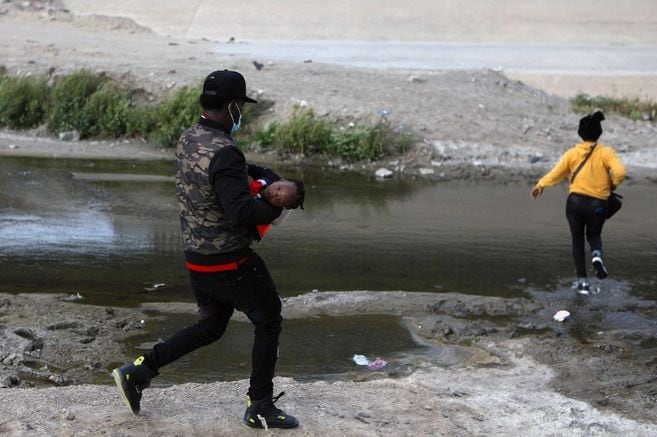
On Friday morning, the Biden administration announced a controversial change in migration policy with which it broke one of its biggest campaign promises. Punished by criticism, the president again changed his mind in the afternoon. What is happening with migration?
President Joe Biden did not have a good Friday. Its abrupt changes in the face of the country’s migration policy have generated unrest within its own party, and show that the border crisis due to the increase in migratory flow is getting out of hand.
What happened?
On Friday morning, the Biden administration announced it would set the refugee limit at 15,000, a historic low left by former President Donald Trump on leaving his administration. In February of this year, the Democratic president pointed out, with some fanfare, that he was going to increase the limit to 62,000 contingents for refugees. Then this decision was not fulfilled with his word, and even worse, he left things as the former Republican president had them.
The announcement sparked a furious response from human rights defenders and some renowned members of the Democratic Party, such as Rep. Ilhan Omar, who was noted to have taken refuge in a camp in Kenya after fleeing the civil war in Kenya. Somalia.
“There are simply no excuses for today’s embarrassing decision,” Omar tweeted.
New York representative Alexandria Ocasio-Cortez joined the critical voices and said the change was “complete and absolutely unacceptable.”
You may be interested in: Biden reminds migrants that this is not the time to get to the US. UU.
The fury of the Democrats caused turmoil in the White House, which after a few hours had to reverse its initial decision. White House Press Secretary Jen Psaki issued a statement noting that the Biden administration will set the new allocation of the refugee limit by before next May 15. But while he suggested the new figure would be higher than former President Trump had, it is unlikely to rise to the numbers Biden promised in February.
“It is deeply disappointing that the administration has chosen to leave in this place the shameful minimum record of its predecessor,” Krisj O’Mara Vgnarajah, president and director of the Lutheran Immigration and Refugee Service told The Washington Post. Several refugee resettlement and migrant support agencies lamented what had happened and expressed disappointment with the direction the president was taking.
Why did Biden back down on his promise?
The migration crisis is already undeniable. The numbers reflect a worrying increase in the arrival of people at the southern border. According to Biden administration officials, they have been slow to make strong decisions to contain the crisis or, albeit, delay the dramatic increase in refugee applications, which has left some migrants in limbo. Hard-line actions are needed at this time, given that this crisis will be key to the next election contest.
In 2022 the midterm elections will be held in the country, and Republicans are aiming with everything they have at the current administration to undermine their popularity and gain ground in the legislative race for seats and key governorships.
We recommend: Immigration in the Biden Era: Overflowing Promise?
“This reflects the Biden team’s awareness that border flooding will cause record losses in the middle of the period if the Republican Party keeps the problem at the front and in the center,” said Stephen Miller, who was the architect of the Trump’s migration policy.
With the advancement of vaccination and the economic recovery afloat, Republicans only have the immigration letter left to attack Biden and point to him as responsible for a crisis that, while not entirely his responsibility as it is a pre-existing problem, it is the main figure in the drama that is developing in the south today.
Biden is trying to solve the problem on all fronts, and in addition to reconfiguring migration policy to counter the first quarter figures, he entrusted his vice president, Kamala Harris, with the task of studying what the United States can do to curb Central American migration. Harris announced Thursday that he will travel to Mexico and Northern Triangle countries to work alongside these nations in the migration crisis.
See also: The Biden government, on the defensive in the face of its first migration crisis